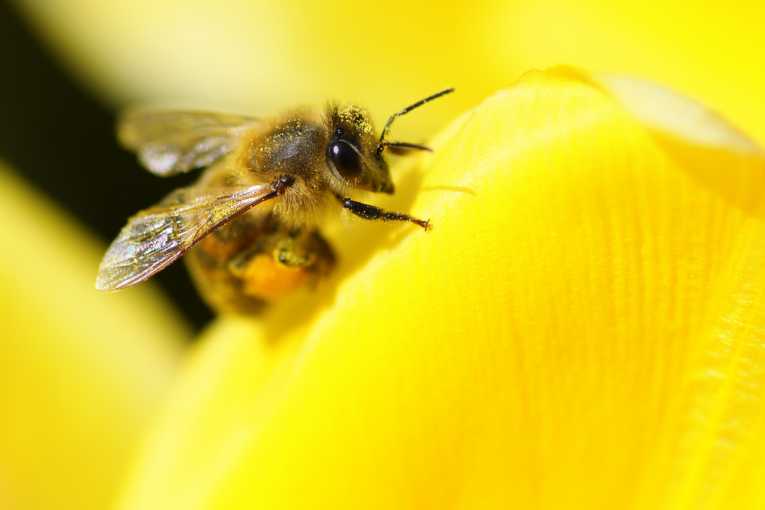Every life-form on the planet has a role to play in the cycle of life on the planet, from the miniscule micro-life to the towering giraffe. Nothing in nature is without design or purpose. Killing off a species or a genus, class or phylum be it lower invertebrates (viz. snails, worms) to large vertebrates (viz. mammals, birds) affects the entire ecosystem and biodiversity on the planet.
We often do not respect the role of tiny creatures based on our anthropocentric planetary view and our size matters consideration, paying attention only to the decimation of larger life-forms. How often have we thought about the consequences of our toxic chemicals on the insect world? How often do we relate our food production processes to lethal environmental destruction? Without bees two-thirds of our natural crops would not be propagated.
Food production is in fact one of the top sources of toxic bio-engineered and chemical release sources in the grander industrial pollution category. The agricultural industry has for decades been a sector that has used and promoted the use of pesticides, insecticides and biocides for the sole purpose of achieving higher crop yields at the risk of the environment.
Agrochemical manufacturers are some of the world's most notorious polluters, manufacturing lethal pesticides amongst other dangerous chemicals. Pesticides and genetically-modified crops equal multinational profiteering with companies like Bayer (Germany), Monsanto (USA), Dow Chemicals (USA), Syngenta (Switzerland) and BASF (Germany) dominating the agri-industry.
Honey Bees
Bees are vital to the proliferation of our food crops, they engage in natural forms of pollination, and are the unpaid drones in our food supply. Bee keepers started to notice drastic bee hive disintegrated referred to as 'Colony Collapse Disorder' and the associated timing of the use of pesticides.
In 2008, Germany suspended the registration of a range on pesticides used in seed treatment, following a flurry of complaints from bee-keepers reporting bee-kills after applying clothianidin. Clothianidin has long-lasting effects as a systemic chemical moving through the plant structure up to the pollen and nectar, ingested by the bees.
Furthermore as a persistent chemical it may leach into surface and ground water resources. The lethal effect of pesticides and the direct tie to the bee-life-cycle should be a priority for all environmental authorities globally. Bees are intrinsic to human food production.
The problem with pesticides is that their toxicity affects not only target species but non-target species and resources such as water and soil. Neonicotinoids, chemically similar to nicotine, started to replace nicotine in the eradication of what was classified as 'agricultural pests'. Clothianidin was registered with the US EPA in 2010 for the seed treatment of corn and canola. A range of pesticides, nicotinyl (neonicotinoid) insecticides, including imidacloprid, thiamethoxam, clothianidin, have been researched extensively in France, leading to a ban in 1999 on most applications of imidacloprid. The federal French government commissioned further scientific research through the Commit' Scientifique et Technique, concluding that treatment of seeds with neonicotinoid, imidacloprid produces significant risk for bees and even rejected Bayer's application for the pesticide clothianidin. In addition to France's ban, others followed on the ban on clothianidin, such as Germany, France, Italy, and Slovenia.
Similar incidents occurred in the US, with North Dakota bee-keepers in 1995 reporting loss of bee species when the other notorious pesticide imidacloprid was used in oilseeds. France also reported huge bee colony drops when imidacloprid (named Gaucho in France) was used on sunflower seeds. Germany pushed for a move in Europe to ban the use of neonicotinoids.
US bee-keepers and environmental organisations have been calling for similar moves from their government, following Europe's strong stance.
In a Wiki-Leak release in 2010, it was revealed that the US EPA was well-aware of the toxicity of clothianidin but failed to act responsibly in banning its use.
Excerpt from US EPA (2010) Memo:


Just tracking the global bee-keepers incidents and the relation to the use of a neonicotinoid, is something a multinational simply can't spin their way out of. Irrespective of all the industrial propaganda, independent governments and scientific bodies in Europe have revealed plausible data and conclusions that is reason enough for the US EPA and other countries globally to ban the use of toxic pesticides.
As with all environmental options, there exist non-toxic methods such as natural biological agents to guard against agri-pest invasions on food crops. As with polluting energy and everything we have chosen thus far harming the environment, there always exists a better way. The only thing to do is pressure for the best environmental options in all spheres of industry and governance.
href="https://earthtimes.org/environment/insects/index.html">Insects














